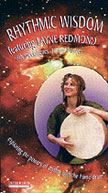 Layne Redmond's Layne Redmond's
"Rhythmic
Wisdom"
a review by Kent Multer
This video is a very good introduction to frame drumming, and also to the
history and spirituality of drumming. I'd recommend it to anyone
interested in any of these topics, especially women, since Redmond has made
empowerment of women a major theme in her work.
The 70-minute video includes instructional segments as well as three duets
by Redmond and Tommy Brunjes. The duets are well photographed, so theywill be useful to students, as well as just plain fun to listen to. They
are also a good demonstration of the great variety of sounds that can come
from a couple of "simple" little drums. The video also has some short "lecture" segments on background topics such as ancient history of frame
drums, the effect of drumming on brain waves, and the special relationship
that women have with rhythmic communication.
The instructional segments start with hand/body position, basic strokes, and 3- and
4-step rhythm patterns. Next you learn some more complex 8-step rhythms, followed by a segment with Redmond and Brunjes playing together,
to show how pairs of rhythms can interlock. Additional segments cover advanced techniques: finger rolls, snaps, and "ki-ti-ta-ka" rapid strokes
using a technique borrowed from the Indian kanjira. All this material is presented very well. Every stroke and pattern is repeated enough times, at
different speeds, to make it easy to pick up without the endless rewinding-and-replaying that some other videos force you to do.
In this video, Layne teaches techniques for a tar-type drum: fairly large,
with no jingles or other "accessories." She uses a seated playing position, with the drum resting on one knee. This is good news! I have
seen many beginners struggle with the various hand-held playing styles that
she, and other notables such as Glen Velez, usually teach. Hand-held
playing seems to be especially tough for people with small hands, e.g. women. Some beginers find that they can only play for a few minutes before
their fingers start to hurt, which can be pretty discouraging. The seated
playing style, with the drum supported by the leg, should be much easier to
learn.
In the duet segments, she and Tommy do use some hand-held playing styles, and they play tambourines in one piece. There is also a segment where they
demonstrate several other types of drums: Middle Eastern-type tambourine,
bendir, pandeiro, and kanjira.
"Rhythmic Wisdom" has useful lessons, interesting performance segments, some valuable history and background, and a real dedication to the Spirit
of Rhythm. The picture quality is excellent, and the sound quality is OK (which, in my book, is better than average: have you noticed how many of
these drumming videos have HORRIBLE sound? They often sound like they were
recorded in someone's garage using a home stereo and a Mr. Microphone.
This one is at least decent).
I give it "two drums up." -- Kent Multer, kent@dallas.net
Contents:
01:00 intro. lecture
05:00 tambourine duet
08:30 lecture -- symbols on drums, ancient art, brain waves, altered states, shamanic traditions
17:00 frame drum duet
20:00 basic strokes & simple 3- & 4-beat rhythms
36:45 8-beat rhythms
43:00 interlocking rhythms
48:00 "ki-ti-ta-ka" (kanjira style)
55:45 finger rolls & snaps
62:45 demo of other types of frame drums
65:45 closing remarks
67:00 frame drum duet
This review copyright (C) 2000 by Kent A. Multer. All rights
reserved.
Kent Multer
701895, Dallas TX 75370
Magic Metal Productions
(214) 824 8937
KOBUSHI taiko drummers
Rhythm Tribe
|
Layne Redmond has kindly sent us an
excercise in odd time cycles, from her tape series.
Remember to Visit
Layne's website
Also, if you are interested in rhythm and
the spirit, please read Hazrat Inayat Khan on the
Law of rhythm
Remember to check out the
new
Hands
On'Semble page
for more frame drumming fun...
|

